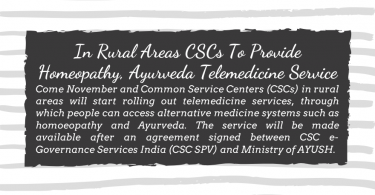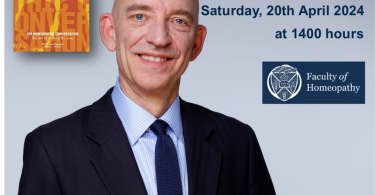Dr Isha Gupta (ED): How and when did you first become acquainted with homeopathy?
Dr Samir A Chaukkar (SC): I got acquainted to homeopathy quite early in my childhood days when we used to take treatment for recurrent cold and cough from Dr Sarosh Wadia. We used to travel with our parents from north of Mumbai to south a distance of at least 4 hours in those days to sit in a queue of many people waiting patiently for their turns.
ED: There are several new methods of homeopathic practice created after Hahnemann. Whichever method a homeopath follows, the case taking remains an important aspect. What is your advice for the novice homeopaths?
SC: Yes I agree that case taking is the bedrock of any case. A case
well taken is half solved. My advice to junior homeopaths and my students is just not fall prey to newer and newer methods and short cuts in homeopathy because though these newer methods are quite enticing they can lead only to failures and depression. There is no alternative to sound case taking as Dr Hahnemann said ‘Fidelity in tracing the picture of
the disease’.
ED: Which book has influenced you the most and why?
SC: I have been influenced by many books and many teachers in my lifetime and every book offers something different and energizing when I read it at different stages of my life. To name a few I always tell my
students and junior homeopaths and all over the world where I
speak to read books like Boericke materia medica, Kents lectures,
Choudhari, and of course Allens keynotes. The italics of Boericke
Materia Medica are enchanting and breathtaking and you see
them in your daily practice, Choudhari for its comparisons, Kents for his interesting way of evolving a picture of a drug. Everyone was a genius.
ED: Tell us something about your journey from a graduate to a renounced speaker?
SC: I used to teach even when I was in first year. I distinctly remember we had our own group who used to sit after college hours and enact drugs like a parady, as I went up the academic ladder I left no stone unturned teaching my juniors materia medica in the evening and this teaching
has been my soul since I joined homeopathic college. After graduation most of my friends joined homeopathic practice or stalwarts, some even ventured into allopathy and insurance too. But I had decided my profession
and it was teaching. I joined a homeopathic college during my internship and worked free for 6 months and then after that I joined YMT homeopathic college in 1993 as a lecturer in material medica till 2008 after which I joined Dr Batras Academy where I have been working till date as
Dean. My passion of teaching has led me to travel most countries
in the world where I keep the fire of teaching within me alive and spread the goodness of homeopathy all over the world.
ED: What are the scope and limitations of homeopathy in the treatment of the ailments of the modern world?
SC: I don’t think if rationally and judiciously practiced there are any limitations but limitations come only when young homeopaths try to ape the
masters and try to do something heroic in incurable cases. Homeopathy has a great scope in pathological cases also but in hands of a novice these cases are a receipe for disappointment and frustration as well as danger to
patient’s life. So the limitation is in the path not in homeopathy. As far as scope is concerned all the illnesses of modern life are amenable to homeopathy making it the best system of medicine in autoimmune problems, allergies, idiopathic, psychosomatic, psychiatric, pediatrics etc.
ED: What are the toughest cases you healed with Homeopathy
according to you?
SC: I think all my cases are tough and I don’t really grade them but few cases which challenged me were cases of autism, cerebral palsy, mental retardation and severe types of vitiligo and psoriasis, cases of Ankylosing spondylitis and RA.
ED: How has been your experience giving lecture at various colleges
across the world?
SC: I am enthralled by the amount of interest and inquisitiveness shown by foreign homeopaths and their thirst for homeopathy especially the Turkish and Brazilian homeopaths. It’s a totally different experience with them since they take homeopathy much more seriously than their Indian counterparts where I feel homeopathy is taken more or less for granted. Homeopaths abroad are not only sincere in their approach but also very systematic and are always open to learning new concepts as well as basics in homeopathy.
ED: What is the scope of homeopathy in foreign countries and what will be your piece of advice for the homeopaths willing to practice
abroad?
SC: As far as homeopathy is concerned abroad it is in a very budding phase, for anyone to practice abroad you need to be a resident of that country and give some preliminary exams and then practice homeopathy. Many places it’s not legal to practice homeopathy only. Homeopathy abroad can be legally practiced only by Doctors who have finished their allopathic training or dentistry. There are many homeopathic colleges in Canada and homeopathic associations in Turkey and Brazil that teach
homeopathy as part time course but they provide only weekend
seminars.
ED: How you see the future generation of Homeopaths in India, what will be your advice to them?
SC: The future for homeopathy is bright and the sky is the limit for all the homeopaths who want to sincerely and ethically practice homeopathy according to Hahnemannian principles. My advice to them is to only to
be firmly rooted to ground and don’t fly with modern stalwarts but start with basics and then ascend slowly with enough cases behind their back to support so that they don’t fall down on ground so hard as to not get up
again. Just stick to winners, just stick to basics.
ED: Your insightful and interactive lectures and case discussions along with books you have written are indeed a source of inspiration and learning for the serious homeopaths. Such practical knowledge is quite essential to apply the theoretical concepts of homeopathic philosophy in practice. What is your say on this (i.e. sharing your experiences with students)?
SC: Theory should always be supported by cases and I am a staunch believer that whatever you preach you should practice, whatever you teach you should be able to show the next generation through your cases. Hence in all my seminars and training, I see to it that there are lots of cases to support the concepts or theory I speak for easy palatability and easy digestion of homeopathy.
ED: What do you feel is the most gratifying for you as a professional – medical practice, teaching, writing or research? Or; what has been/will be your most gratifying achievement as a homeopath?
SC: For me my journey from a teacher to a practitioner to an author of homeopathic books has been a learning experience and one of evolution. These have been the bedrocks of my career but I must say I love my role as a teacher as the best in my career which I will play all my life till I die. Once a teacher always a teacher.
ED: What are your future plans; are you writing some more books etc.?
SC: I am writing a few books namely on addictions, skin, comparative materia medica volume 2 etc. My future plans are to teach a lot of homeopaths in India and abroad, heal lots of patients and also write a lot of books for the young generation.




